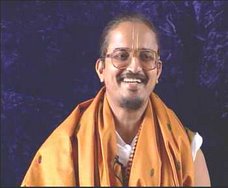Nama Article - 22nd September 2007
Excerpts from a discourse by our Sri Sri Muralidhara Swamiji
Sri Ramakrishna Paramahamsa was devoted to Kali and Krishna in the form of Radha-Kãnta. Totãpuri, a Vedanta Sanyãsin, arrives at his place. Totapuri advises Ramakrishna, "You are performing 'saguna upãsana' (worship of God in form). You should change your ways and move to 'nirguna upãsana' (worship of the formless aspect of God). You should turn your vision inward and fix it in Atma Swaroopa. Ramakrishna receives 'upadesa' from Totãpuri. In the evenings Paramahamsa would take a stroll on the banks of the Ganga performing kirtan of
'Hare Rama Hare Rama Rama Rama Hare Hare!
Hare Krishna Hare Krishna Krishna Krishna Hare Hare!'
He used to clap his hands while doing the kirtan.
One day Totãpuri notices Ramakrishna Paramahamsa performing Nãmakirtan and mocks at him, "what a fool have I been to have taught Vedanta to you? You have not yet come up the ladder. You are still doing kirtan of 'Hare Rama Hare Rama!' as one would make chappãti with the dough!" He always criticized Ramakrishna Paramahamsa in this manner. Every time Ramakrishna began his kirtan, Totãpuri would ridicule him, "Oh! You have begun to make chappãtti!"
One day this Vedantin Totãpuri was afflicted with excruciating stomach pain. Who was afflicted with such unbearable pain? -Totãpuri! The one who possessed the knowledge that 'sariira' (body) was different from the Atma suffered from such pain. How severe was pain? He decided to end his life by jumping into the Ganga. So intense was his pain. In spite of Ramakrishna being his disciple, Totãpuri sought the former's help. "I am unable to bear this stomach pain."
Ramakrishna said, "Don't you worry. Do not think of jumping into the Ganga. Do not think of ending your life. I will tell you a very easy way out."
Speaking thus, Ramakrishna made Totãpuri sit in front of him and began to do Nãmakirtan,
"Hare Rama Hare Rama Rama Rama Hare Hare!
Hare Krishna Hare Krishna Krishna Krishna Hare Hare!"
When Paramahamsa performed kirtan of this ten times there remained no trace of the stomach pain in Totãpuri! He was wonderstruck at the 'mahima' (greatness) of Bhagavan Nãma.
If the chant of Bhagavan Nãma ten times removed such agonizing stomach pain of a Vedanta Sanyãsin of a high order then what to speak of the 'prabhãva' of Nãmakirtan?
Hare Rama Hare Rama Rama Rama Hare Hare
Hare Krishna Hare Krishna Krishna Krishna Hare Hare
